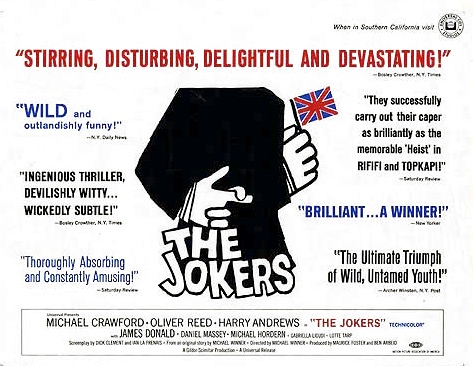
THE JOKERS
UK, 1967, 94 minutes, Colour.
Michael Crawford, Oliver Reed, Harry Andrews, James Donald, Daniel Massey, Michael Hordern, Frank Finlay, Warren Mitchell, Rachel Kempson, Edward Fox.
Directed by Michael Winner.
The Jokers is an early film by eccentric director Michael Winner. After beginning with small-budget films in the early 1960s including The Cool Mikado, Winner got into his stride with You Must Be Joking in 1965. The Jokers was his next film. He then went more upmarket with I’ll Never Forget Whatsisname and The Games. Winner then spent the 70s in the United States making interesting westerns like Lawman and Chato’s Land, spy thrillers like Scorpio as well as the variation on The Turn of the Screw, The Nightcomers with Marlon Brando. He made five films with Charles Bronson including three of the Death Wish films. However, he did not make so many films during the 1990s – but still remained a character in England with appearances on television, commercials, restaurant critiques.
This film is something of a shot at the British upper classes. Oliver Reed and Michael Crawford are two brothers who are drifters, Michael Crawford having been drummed out of the army. While they don’t trust each other, they decide to perform the ultimate robbery – and steal the Crown Jewels. Needless to say, not everything goes their way.
Michael Crawford and Oliver Reed seem an unlikely pair of brothers. The film boasts a very good cast of strong British character actors who also seem to be enjoying themselves.
1. A good example of the crime genre? Differences, appeal, success?
2. The importance of the British tone of the film: English and London settings, a reliance on British traditions, style? The satire on the various levels of British life, society? By way of joke a tribute to Britain?
3. The contribution of London, in colour, the swinging side of London, high society, the ordinary side of London in the police, workers, the military, the tourists, especially at the Tower? The musical background?
4. The imaginative value of the robbery, its motivation, the involvement of the characters? The wit and satire in the dialogue?
5. The significance of the title, its irony, its application to the two brothers, especially to Michael?
6. The presentation of English society, the Tremayne family? The importance of expectations? Aristocratic behaviour? The university, the army? The pressures on the various brothers? Michael and his losing his positions? David and his inability to be an architect because of society? The rebellious attitudes in defiance of society?
7. Was it possible for the audience to sympathize with the two brothers in defiance? Their wanting to work within the letter of the law? The ingenuity of their plan, their wanting to be heroes and well publicised? Their yearning for success?
8. How interesting was the character of David? The introduction to him, the type, his work, relationship with women, dominance of Michael? The man who is basically honourable? The details of his plan, his involvement in the execution? The fact that he was double-crossed? The impact of his arrest? His trying to bring down Michael? The happy reconciliation at the end? What had he achieved?
9. The contrast with Michael, younger, brasher type, his being sent out from university and army? His relationship with David and always being second? His skill in helping David with the plan? His ability to cover his tracks? The point that he made in double-crossing David? His being the ultimate joker and hero? What had he achieved by the end of the film?
10. The importance of the portrait of the family, the remarks of mother and father, dinners, cricket matches etc.? The picture of the girl friends, the parties, the photographer? Newspaper reports of their goings-on?
11. The contrast with the police? Sympathy for the man in charge of the investigation, his hard-headedness, shrewdness? In some ways a tribute to the police? The character of Catchpole? His helping, his following the brothers etc.? The head of Scotland Yard and his wanting to do the right thing?
12. The portrait of the army? The young types involved in army life? The Colonel and his dithering and showing off to the photographers, his fear of danger, his not knowing what was going on? How well did the film poke fun at his incompetence? The importance of this satire on the army?
13. The details of the various bomb scares and the humour consequent on these? The indication of the risk of danger with the bomb in the toilet?
14. How well prepared was the audience for the robbery, its detail, cleverness? The week's aftermath with the two brothers on edge?
15. Did the audience expect Michael to trick his brother? The various devices used to trick Michael into the truth? The printing of the paper, the changing of the time on tho clock, the using of the poor man to meet the police in Trafalgar Square?
16. How satisfactory was the happy ending? How enjoyable an a satire, a caper and the points made about society and human nature?